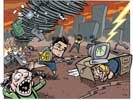The Suicide Door
by in Feature Articles on 2010-07-29At the university where Diogo worked, the Computer Science program outgrew its status as an unloved child of the Mathematics department. It was to become its own department, and that meant it finally deserved its own building. Since the university in question had a very strong architecture program, the university searched for the biggest names to design the building.
Enter Laurent. He flew in to consult and prepare designs for the building; he was fresh off a project in Dubai and his next port-of-call was Tokyo. He was a name that could name names. The exterior renders he provided were stunning, full of glass and sweeping lines. The designs leapt up on a desk, stomped their feet and screamed, "I AM MODERN AND TECHNOLOGICLYISH!" To the casual spectator, they were fantastic. As Diogo discovered, when you actually had to live in the building, things got much worse.

 Jun 10
Jun 10 When Eric C. arrived at his new job, it was with a huge sense of relief. His old workplace had been a haven for cowboy coders and anarchic hackers, where the only semblance of consistency was in everyone's preference to modify code directly in production.
When Eric C. arrived at his new job, it was with a huge sense of relief. His old workplace had been a haven for cowboy coders and anarchic hackers, where the only semblance of consistency was in everyone's preference to modify code directly in production. Many years ago, Dan B. worked at a large accounting firm that had several small, satellite offices spread throughout the world. The offices shared data -- mostly email -- via a dial-up based file synch operation that would run several times throughout the day. Since these offices were so small, they didn't need IT support on staff; instead, they'd rely on the IT staff at the central office for help.
Many years ago, Dan B. worked at a large accounting firm that had several small, satellite offices spread throughout the world. The offices shared data -- mostly email -- via a dial-up based file synch operation that would run several times throughout the day. Since these offices were so small, they didn't need IT support on staff; instead, they'd rely on the IT staff at the central office for help. If Lyle could be summed up in one word, it'd be "competitive." If he could be summed up in three words, it'd be "ultra-competitive jackass." If you had $21.00 on you, Lyle would make it a point to have $21.50. If you estimated that a task would take you twelve hours, it'd take Lyle eleven hours and 45 minutes. If a distant relative died, somehow two of Lyle's distant relatives died. He was the kind of guy that would play basketball against a nine year old to win, then he'd make fun of the kid for losing, then he'd make fun of the kid for crying. If a stranger asked Lyle what time it was, he treated it as a challenge.
If Lyle could be summed up in one word, it'd be "competitive." If he could be summed up in three words, it'd be "ultra-competitive jackass." If you had $21.00 on you, Lyle would make it a point to have $21.50. If you estimated that a task would take you twelve hours, it'd take Lyle eleven hours and 45 minutes. If a distant relative died, somehow two of Lyle's distant relatives died. He was the kind of guy that would play basketball against a nine year old to win, then he'd make fun of the kid for losing, then he'd make fun of the kid for crying. If a stranger asked Lyle what time it was, he treated it as a challenge.